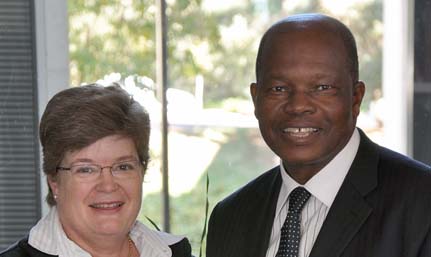Latest News Archive
Please select Category, Year, and then Month to display items
06 November 2020
|
Story Rulanzen Martin
|
Photo Supplied
 Dr Tronél Hellberg, UFS alumna, completed her PhD in Music from the OSM in 2018.
Dr Tronél Hellberg, UFS alumna, completed her PhD in Music from the OSM in 2018.
The COVID-19 pandemic and subsequent lockdown has posed many challenges. Not only has it distrupted our normal way of life it but has created a ‘new normal.’ Even in these trying times, alumni from the University of the Free State (UFS) have adjusted to the new normal by going above and beyond to make it as normal as possible.
One of these is Dr Tronél Hellberg, an alumna from the
Odeion School of Music at the UFS, who has supported Grade 12 learners by presenting free online prescribed music theory classes. The classes are beneficial for learners following the CAPS or IEB curriculum. “I trust the online videos will assist learners and teachers to get through this challenging Grade 12 year,” says Dr Hellberg. She has
recorded more than 38 live videos on her
G-Sential Theory of Music Facebook page.
The recordings are accessible to Grade 12 learners and their teachers at no cost. Dr Hellberg established the
G-Sential Theory of Music in 2007 and has since published 20 theory of music books.
Apart from assisting in teaching, one of her main objectives is to reach less fortunate learners who do not have access to music teachers. “Grade 12 music literacy requires an accumulative understanding of theory of music,” she says. With her initiative she also aims to “fill any gaps” to solidify knowledge and information which might still be unclear.
Valuable advice for businesses in difficult times
2013-04-15
|
 |
|
Prof Helena van Zyl, Director of the Business School, and Dr Reuel Khoza.
Photo: Stephen Collett
15 April 2013 |
Dr Reuel Khoza, Chairman of the Nedbank Group, shared the group’s valuable rules for managing a bank in difficult times in an MBA lecture on the Bloemfontein Campus. Dr Khoza is a visiting professor at the UFS Business School.
He focused in the lecture on the group’s business and leadership model and highlighted some do’s and don’ts:
- Do not surprise your stakeholders on the downside – communicate transparently, particularly when there is bad news.
- Retrenching staff to contain costs should be a last resort – the damage to corporate culture from retrenchments is immense. Follow and support your customers – get as close to them as possible because business changes slowly, but customer behaviour can change in an instant.
- Integrated central capital and funding management.
- Entrench well-established reporting, KPIs and measurement systems.
- Ensure strong independent risk management.
- Manage your cost base – anticipate downturns and re-base your costs to avoid crisis-cost management.
- Take advantage of opportunities – an economic downturn creates a situation where valuations fall and assets are sold off, which can be a great opportunity for acquisitions.
- Keep innovating – innovation does not have to be a costly exercise, as the right culture can promote and encourage experimentation and collaboration.
- Whatever you do – avoid a price war, as expedient pricing decisions may hurt the business in the longer term.